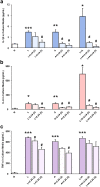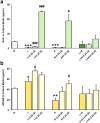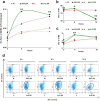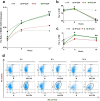A novel modified-curcumin 2.24 resolves inflammation by promoting M2 macrophage polarization
- PMID: 37726411
- PMCID: PMC10509274
- DOI: 10.1038/s41598-023-42848-x
A novel modified-curcumin 2.24 resolves inflammation by promoting M2 macrophage polarization
Abstract
To assess resolving-like activity by a novel chemically-modified curcumin (CMC2.24) in a "two-hit" model of diabetes-associated periodontitis. Macrophages from rats were cultured in the presence/absence of either Lipopolysaccharide (LPS, 1st hit); or advanced-glycation-end products (AGE, 2nd hit); or both combined. CMC2.24 was added as treatment. The conditioned media were analyzed for MMP-9, cytokines (IL-1β, IL-6, TNF-α), resolvins (RvD1, RvE1, lipoxin A4), and soluble receptor for AGE (sRAGE). The phenotypes of M1/M2 macrophage were analyzed by flow cytometry. Both LPS/AGE-alone, and two-combined, dramatically increased the secretion of MMP-9 by macrophages. CMC2.24 "normalized" the elevated levels of MMP-9 under all conditions. Moreover, CMC2.24 significantly reduced the secretion of IL-1β and IL-6 with a fewer effects on TNF-α. Importantly, CMC2.24 increased RvD1 and sRAGE secretion by macrophages exposed to LPS/AGE; and both treatment groups exhibited increased M2 relative to M1 populations. Furthermore, scatter-diagram showed the macrophages gradually shifted from M1 towards M2 with CMC2.24-treated, whereas LPS/AGE-alone groups remained unchanged. CMC2.24 "normalized" cytokines and MMP-9, but also enhanced RvD1 and sRAGE in macrophages. Crucially, CMC2.24 appears to be a potent inhibitor of the pro-inflammatory M1 phenotype; and a promotor of the pro-resolving M2 phenotype, thus acting like a crucial "switch" to reduce inflammation.
© 2023. Springer Nature Limited.
Conflict of interest statement
LM Golub is listed as an inventor on several related patents, including CMC2.24, and these have been fully assigned to his institution, Stony Brook University, The State University of New York (SUNY). F Johnson is also listed as an inventor on several related patents, including CMC2.24, which have been fully assigned to Stony Brook University and to Chem-Master Int. Inc., on a shared basis. In addition, Traverse Biosciences Inc. has exclusively licensed patents from the Research Foundation for the State University of New York (RF/SUNY) covering the structure and use of the chemically-modified curcumins for the purpose of commercialization in human and animal health. The remaining authors declare that the research was conducted in the absence of any commercial or financial relationships that could be construed as a potential conflict of interest.
Figures






References
Publication types
MeSH terms
Substances
LinkOut - more resources
Full Text Sources
Miscellaneous

